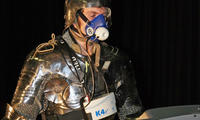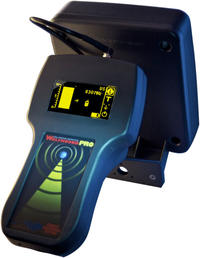-
Students develop landmine detection robot
A team of Texas A&M University at Qatar students and faculty has developed a state—of-the-art landmine detection robot as part of the NI Mine Detection Robot Design Contest; The competition challenged engineering students in the Middle East to work toward solutions to the real-life landmine problem that the Arab region and other areas face in the aftermath of conflict
-
-
Test for classifying force used in bottle stabbings developed
Stabbing is the most common method of committing murder in the United Kingdom; in approximately 10 percent of all assaults resulting in treatment in the U.K. emergency units, glasses and bottles are used as weapons; official UK estimates suggest that a form of glass is used as a weapon in between 3,400 and 5,400 offenses per year; engineers at the University of Leicester have for the first time created a way of measuring how much force is used during a stabbing using a broken bottle
-
-
Lawmakers blast the Federal Protective Service
Last week lawmakers held a hearing to investigate the Federal Protective Service’s (FPS) progress in addressing its ongoing problems; the agency has made little progress drawing the ire of lawmakers; in recent years, FPS has suffered from a series of high-profile security failures
-
-
Old fashioned methods best for detecting IEDs
U.S. troops in Afghanistan and Iraq have resorted to an old method to detect improvised explosive devices (IEDs); using long poles with hooks on the end, troops feel around in the dirt to detect any IEDs
-
-
Too much armor hampered French

The French may have had a better chance at the Battle of Agincourt had they not been weighed down by heavy body armor; during warfare in the fifteenth century, soldiers wore steel plate armor, typically weighing 30-50 kg; this may have been a contributing factor in whether an army won or lost a battle
-
-
Wisconsin hospitals ahead of the curve
In the 2009 H1N1 flu epidemic while public health officials across the United States were contending with shortages of basic supplies like ventilator masks, Wisconsin health authorities were able smoothly to weather the storm thanks to its stockpiles of protective clothing, emergency planning, and advanced training
-
-
WWII bombs still plague Germany

For one bomb squad in Germany the Second World War never ended; members of Germany’s War Ordnance Disposal Service are racing against time to locate and safely defuse the hundreds of thousands of unexploded bombs dropped by Allied war planes that still litter the country
-
-
Studying disasters in order to prepare for them
Disaster Research Center scientists study the world’s worst disasters in hopes of saving more lives in the future; one of the center’s experts says that disaster planning is constantly changing: “As we have a combination of new threats that face us — natural and technological — as we have changes in climate, as we have changes in population density, in where people are living, people are put at risk and new issues are created”
-
-
Improving disaster response amidst budget crunch
As lawmakers struggle to cut the budget and reduce spending, some are seeking find ways to be more efficient with disaster response and recovery funds; the Senate Homeland Security and Governmental Affairs subcommittee held a hearing to explore ways to make the Federal Emergency Management Administration’s (FEMA) disaster response more efficient
-
-
NPIA rolls out mobile fingerprint technology
New mobile fingerprint readers allow police in England and Wales to check an individual’s fingerprint against a national database — and do so in two minutes; more than half the forces in England and Wales have already received the new devices
-
-
Private contractors outnumber government security two to one

A recent survey found that the number of private security contractors outnumber police officers two to one around the world; in some countries, the difference between private security contractors and law enforcement officials is even more significant; the report also noted several critical emerging issues as a result of the increasing use of private contractors including oversight, the role of government, and concerns for public safety
-
-
DHS seizes ancient Egyptian relics in smuggling bust

Last Thursday DHS officials made an announcement that seemed more fitting for a Hollywood movie — agents had broken up an antiques smuggling ring that had illegally shipped ancient Egyptian artifacts to the United States; among the confiscated goods was a sarcophagus that dated back to the seventh century B.C.
-
-
Minneapolis man single-handedly battles Islamic extremism

Individuals like Abdirizak Bihi, who single handedly tries to keep young Somali-American teenagers from becoming radicalized, are part of a growing trend that officials in Washington call “CVE,” combatting violent extremism; since the 9/11 attacks, there have been fifty-one domestically produced jihadist plots or attacks in the United States and that number is steadily growing
-
-
U.S. troops deploy biometrics in the field
Biometric databases in Iraq and Afghanistan are helping U.S. troops combat violent insurgents; in an ambitious move, troops have sought to capture iris scans, facial photographs, and fingerprints from men of fighting age especially those who have been detained for insurgent or terrorist ties.
-
-
BVS combats jail cell phone smuggling

Prisons across the United States are struggling to prevent cell phones from falling into inmates’ hands; in 2010 more than 10,000 contraband cell phones were confiscated from inmates in California prisons; to help officials crack down on these contraband items, Berkeley Varitronics Systems has developed a suite of sophisticated cell phone detectors that can “sniff” out phones even when they are hidden in the most obscure places
-
More headlines
The long view
Why Was Pacific Northwest Home to So Many Serial Killers?
Ted Bundy, Gary Ridgway, George Russell, Israel Keyes, and Robert Lee Yates were serial killers who grew up in the Pacific Northwest in the shadow of smelters which spewed plumes of lead, arsenic, and cadmium into the air. As a young man, Charles Manson spent ten years at a nearby prison, where lead has seeped into the soil. The idea of a correlation between early exposure to lead and higher crime rates is not new. Fraser doesn’t explicitly support the lead-crime hypothesis, but in a nimble, haunting narrative, she argues that the connections between an unfettered pollution and violent crime warrant scrutiny.
Bookshelf: Smartphones Shape War in Hyperconnected World
The smartphone is helping to shape the conduct and representation of contemporary war. A new book argues that as an operative device, the smartphone is now “being used as a central weapon of war.”
